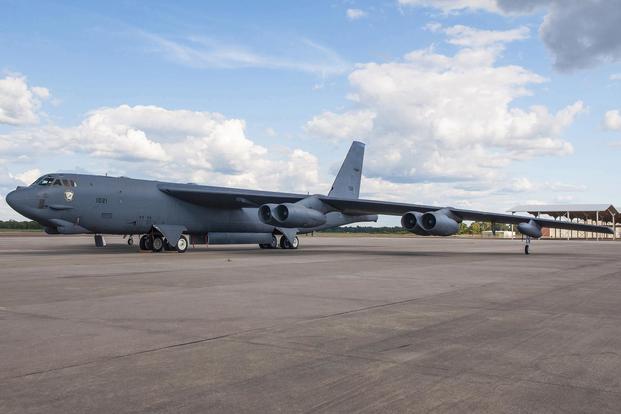While the United States has on numerous occasions accused Russia of violating the Intermediate-Range Nuclear Forces Treaty (INF), Russia believes the U.S. is undermining another one: the New Strategic Arms Reduction Treaty.
In a recent letter to U.S. lawmakers, Russian officials listed a number of alleged problems, which Moscow says could hurt negotiations to extend the New START pact in 2021. The Wall Street Journal first reported the letter's contents.
The unsigned letter asserts two main issues: Russia claims it has not been able to verify the conversion of some B-52H Stratofortress bombers that were slated to be changed to a conventional-only role. Another treaty provision requires the conversion of some Trident II submarine-launched ballistic missile launchers, something Russia says it has not been able to corroborate since 2015, according to the translated letter verified by the Journal.
"We believe it would be helpful to inform the U.S. Congress about the Russian stands on outstanding issues on the basis of assessments previously communicated to the U.S.," the document states.
Related content:
- No Move to Speed Up New Nuclear Cruise Missile Development
- Want Nuke Reduction? Change Adversary's Behavior, STRATCOM Chief Says
- Pentagon Nuclear Recap Programs May Slow with Democrats in House
New START limits the number of nuclear warheads Russia and U.S. can have to 1,550 each. The treaty is due for recertification in 2021, but the Trump administration has said the U.S. may ditch arms control treaties it disagrees with, notably the INF Treaty.
It remains unclear whether New START is one of the treaties the administration plans to end. But Russia wants to resolve these existing obligations before talks occur, according to the letter.
The issues "shape the current situation around the New START. They also have notable effect on the overall atmosphere of political relationship between our countries and on further prospects of Russian-U.S. strategic dialogue, the need for full-scale resumption of which is becoming more and more apparent," the letter states.
According to the treaty, the U.S. Air Force was required to modify 41 B-52H bombers to a conventional-only role by 2018. Additionally, four Trident missile-launch tubes per Ohio-class submarine were to be removed or altered in order to comply with a 240-missile limit in launch tubes at any given time.
The Air Force said its first B-52 was denuclearized in 2015. According to State Department data released last year, the remaining heavy bombers were converted by 2017, with five extra bombers converted to non-nuclear status.
The Federation of American Scientists, citing the data, said the U.S. has deactivated 56 strategic missile submarine launch tubes since the agreement.
Russian officials said they hope to resolve the points in question and are open to additional inspections before negotiations on revising New START begin, the letter states.
"The Russian side is committed to implementation of its international obligations, including within the framework of the New START Treaty," it says. "If Russia acquires new types of strategic offensive arms, the United States will be informed in accordance with the provisions of the treaty."
-- Oriana Pawlyk can be reached at oriana.pawlyk@military.com. Follow her on Twitter at @Oriana0214.










